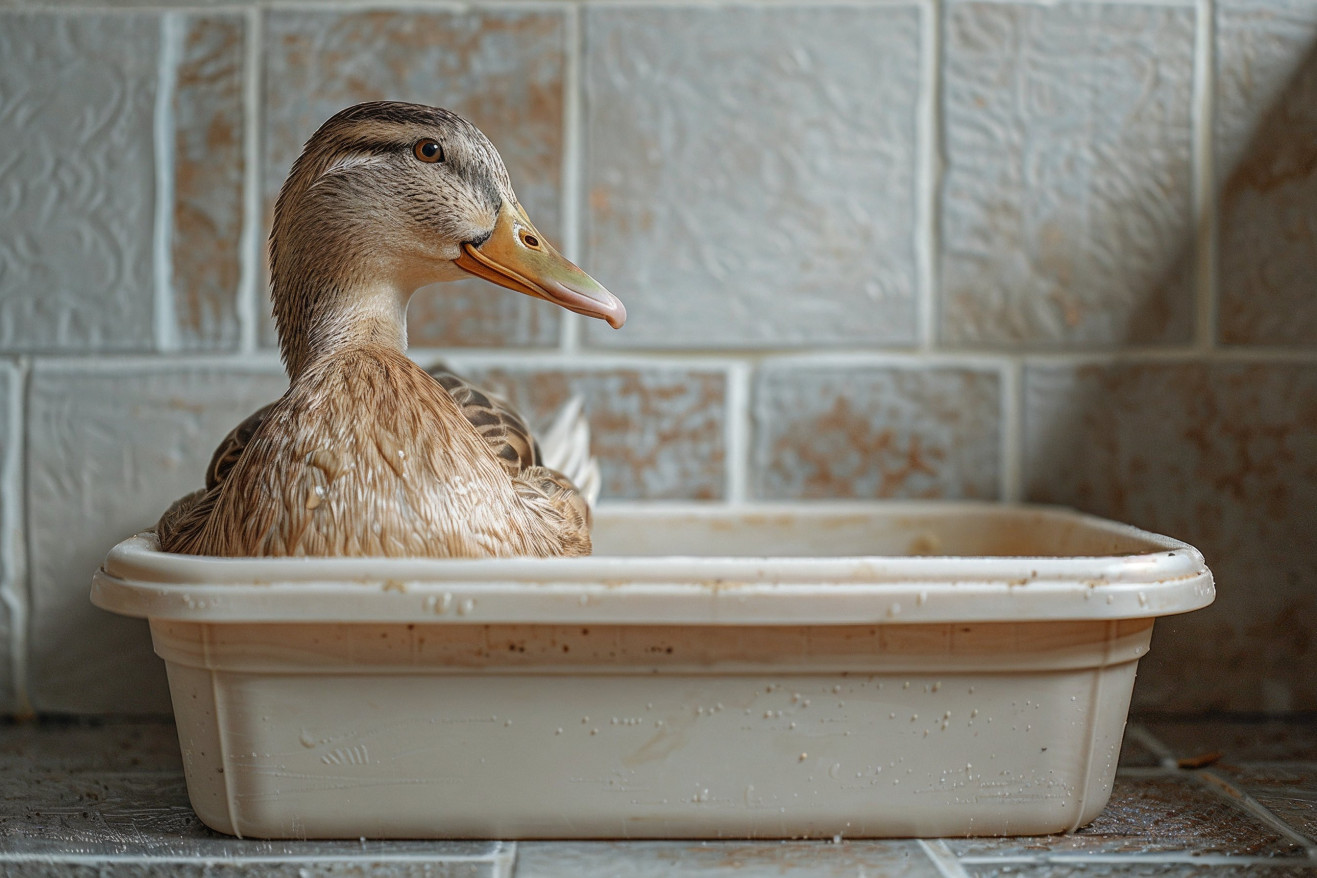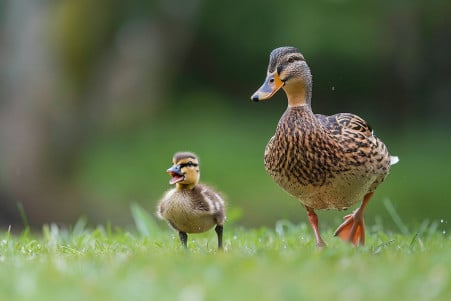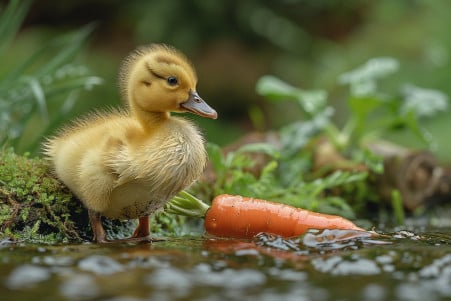Potty Training Ducks: An Investigation Into Possibilities and Constraints
15 May 2024 • Updated 13 May 2024

If you've ever wondered if it's possible to potty train a duck, you're not alone – this strange idea has captured the imaginations of many bird lovers. While ducks are smart and can be trained to a certain degree, potty training is not a viable or practical option. Ducks have very little control over their bodily functions and are frequent and messy poopers, which means potty training is unlikely to work and will be very messy.
We'll investigate the biological, behavioral, and ethical reasons behind this strange question. Drawing on scientific research from animal behavior and avian experts, we hope to give a well-rounded view of why most people would be better off avoiding potty training ducks. This investigation will help you understand the best ways to care for ducks responsibly and what you can realistically expect from their ability to be trained.
Can you potty train a duck?
Duck Biology and Behavior
Ducks cannot be potty trained because of the way their bodies are structured and how their biological systems work. In an article on Cuteness, it is explained that ducks do not have a rectum or sphincter muscle, which are required for controlling bowel movements. Instead, they have a cloaca, which is a vent that is used for defecation, egg-laying, and urination when pressure builds up in the body.
The way their digestive system is set up is to help them with thermoregulation, so they need to be able to poop and urinate frequently and without control. While ducks may have a pre-poop dance or shuffling behavior, this is not a reliable way to predict when they will need to go to the bathroom, as explained by New Life On A Homestead.
In addition to their biological limitations, ducks are social animals with individual personalities, but their instinctual behaviors around pooping and peeing cannot be trained out of them. Ducks are intelligent and can be taught simple commands and tricks. However, as explained by Pumpjack & Piddlewick, ducks are not able to understand complex ideas, including the idea of being potty trained. They cannot be taught to associate the feeling of needing to go to the bathroom with the idea of going to a specific place to relieve themselves. This is because their bodies are not set up to be able to control when and where they go to the bathroom. Therefore, traditional potty training is not an option. With this in mind, let’s look at some other ways to help manage a duck’s waste.
How to Deal With Duck Poop: Realistic Solutions and Tips
Given that ducks can't be potty trained in the traditional sense, there are some realistic solutions and tips for dealing with duck poop in a household setting. According to Potty Duck, one way to manage duck poop is to create a specific area or tray for your ducks to go to the bathroom. This can help contain the mess.
Another way to manage duck poop is to use absorbent bedding like wood shavings, straw, or ground corn cobs, which are recommended by Metzer Farms. This can help keep things dry and reduce odors.
The 'deep litter method,' where you add fresh bedding on top of the old bedding, which is described by Life Is Just Ducky, can help create a composting effect that can help control pathogens. In addition, duck diapers or harnesses can be used to keep ducks clean when they're inside, according to Backyard Chickens.
While full potty training may not be possible, creating a routine and using positive reinforcement training, as recommended by Backyard Chickens, can help encourage ducks to go in specific areas. With the right tips and management, duck owners can keep duck poop contained and under control in a household setting.
Keeping Your Duck Habitat Clean and Healthy
Regular cleaning and bedding changes are important for keeping odors at bay and keeping your ducks healthy, according to Cornell University's duck housing and management guidelines. The right flooring, like smooth concrete or wire mesh, can help prevent foot problems, which is recommended in the Cornell guidelines.
Keeping food and water areas separate from the rest of the living space can help keep things cleaner and reduce waste, according to Mannapro's duck raising guide. Limiting where ducks can go in the house or yard can help keep things cleaner and reduce the risk of contamination, according to Tyrant Farms' tips for keeping duck areas clean.
Offering multiple water stations and enrichment opportunities can help your ducks exhibit natural behaviors and reduce stress, according to The Open Sanctuary Project. This will help you keep your pet ducks' habitat clean and healthy.
Specialized Products and Techniques for Keeping Ducks Indoors
If you’re thinking about keeping ducks indoors, specialized products and techniques are necessary to help you overcome the unique hurdles. As explained by Backyard Chickens, duck diapers and harnesses are necessary for keeping indoor ducks without making a mess. Backyard Duck points out that reusable cloth diapers are a more sustainable and cost-friendly option than disposable diapers.
As explained by HouseDuck Care, it’s also important to make sure that you have a place for your ducks to bathe and to keep up with regular grooming to make sure that your indoor ducks stay clean. This source also says that it’s a good idea to start training ducks to wear socks or diapers when they’re young so that they’re more comfortable with the idea of living indoors. Meanwhile, PetHelpful says that it’s important to establish routines and use positive reinforcement to help ducks adjust to living indoors.
By using the right specialized products and techniques, you can make sure that your indoor ducks have a clean, safe, and stimulating environment.
The Bottom Line: Should You Keep a Duck Indoors?
Ducks are messy animals, and keeping them indoors requires a lot of time and effort to maintain a clean living space. As explained in the duck housing and management guidelines from Cornell University, ducks consume and excrete more water than other poultry, and their droppings are over 90% water, which means that their living space needs to be cleaned and changed frequently to ensure that it stays dry and free from odors.
Ducks are also very social animals, and keeping a single duck indoors can lead to stress and other behavioral problems, according to Mannapro's duck raising guide. In addition to these challenges, indoor ducks need to be bathed and groomed regularly, and they need access to water for swimming and preening.
There are also potential health risks to consider, including respiratory problems and infections, when it comes to keeping ducks indoors, according to The Open Sanctuary Project. That said, many people have found that the rewards of keeping ducks indoors as pets outweigh the challenges. That said, it's important to think carefully about the time, effort, and care that keeping a duck indoors will require before making the decision to bring one into your home.
Conclusion: Understanding the Realities of Indoor Duck Ownership
Ducks are social animals, so keeping a single duck indoors may lead to behavioral issues and stress, according to Mannapro's duck raising guide. Indoor ducks also require specialized care, including regular bathing, grooming, and access to water sources for swimming and preening.
Potential health risks, such as respiratory issues or infections, should also be considered when housing ducks indoors, as noted by The Open Sanctuary Project. That said, some people have successfully kept indoor ducks as pets and have found the experience to be rewarding. However, it's important to understand the challenges and responsibilities that come with keeping a duck as a pet before making the commitment.
Responsible duck ownership involves understanding their biological needs and limitations. With the right knowledge and preparation, ducks can make rewarding and entertaining pets for the right owners.


